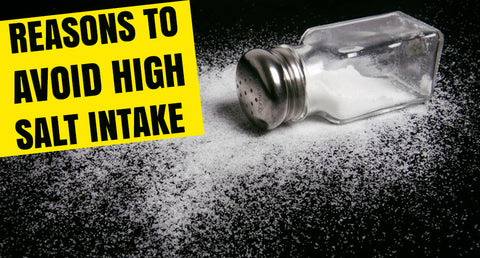Many of us are fond of consuming a high salt diet. People have the habit of sprinkling salt over their favourite dishes like curd, salads and fruits. Though it might enhance the taste for some but the bad news is that it is bad for our health. As per National Institute of Nutrition (NIN), the recommended dietary allowance (RDA) of sodium is 5 grams per day but if the person is pre-symptomatic or suffering from hypertension then, intake should be between 1.5-2 grams per day. The amount may seem too less still it has the potential to reduce the incidence of developing many chronic degenerative disorders like obesity, diabetes and hypertension.
Let’s understand how a high sodium diet can affect our health-
1. Obesity - Consuming a lot of sodium can result in water retention as our body finds it difficult to flush out water from the body. It can lead to oedema and gain water weight. Intake of high salt and fatty foods like snacks, chips, fried foods, fast foods and processed foods can lead to gain in both fat and water weight. In turn it also disrupts the electrolytic balance of body, putting a load on kidneys. Studies have also related high salt intake with a higher body fat percentage.
2. Hypertension and Heart Diseases - Sodium is an integral mineral required for the proper functioning of muscles and to maintain the fluid balance of our body. One of the adverse effects of high sodium is cardiovascular disorders. High sodium intake leads to water retention which exerts pressure on our arteries and blood vessels due to extra fluid. This continuous extra strain gradually thickens artery walls, which further raises the blood pressure. The eventual consequence of this cycle is that the arteries either burst or become so narrow that they cause clogging. Due to the obstruction of blood flow, the chances of getting a stroke or atherosclerosis rises as the supply of oxygen and other nutrients decreases.
3. Reduced Brain Functioning - As a result of decreased supply of nutrients and oxygen to heart, brain functioning also gets altered. The blood supply to the brain also gets affected that can lead to vascular dementia. Changes in the brain structure, infection, lesions and cognitive impairment can be observed.
4. Osteoporosis - High sodium intake is also a risk factor of osteoporosis. It is due to this fact that it results in high calcium excretion in the urine known as calciuria. This might weaken our bones resulting in low bone density. As our bone density decreases, the chances of developing osteoporosis increases. This is a condition in which our bones become porous, prone to breakage and fractures.
5. Increased Hunger - Research studies have noticed that consumption of high salt intake also makes us feel hungry frequently. This could also become a risk factor for gaining weight. Eventually, it also reduces our thirst due to water retention.
Tips to manage salt intake

Here are some of the quick tips which might support in keeping a check on sodium intake.
1. Avoid sprinkling extra table salt on dishes. Instead one can opt for different herbs like garlic, oregano, cilantro, etc.
2. Use low sodium salt.
3. Consuming the right amount of packaged or canned products like sauces, ketchup, soups and spreads, as salt can also be used as a flavour enhancer and preservative.
4. Use home-made spreads and dips using herbs, spices, condiment and yoghurt.
5. Include plenty of fibre rich foods in the diet such as fruits and vegetables.
6. Avoid cured meat and seafood as it also contains salt.
7. Read the ingredients and nutrition label of packaged foods carefully and check sodium content per serving, as it might assist you in making a better choice.

